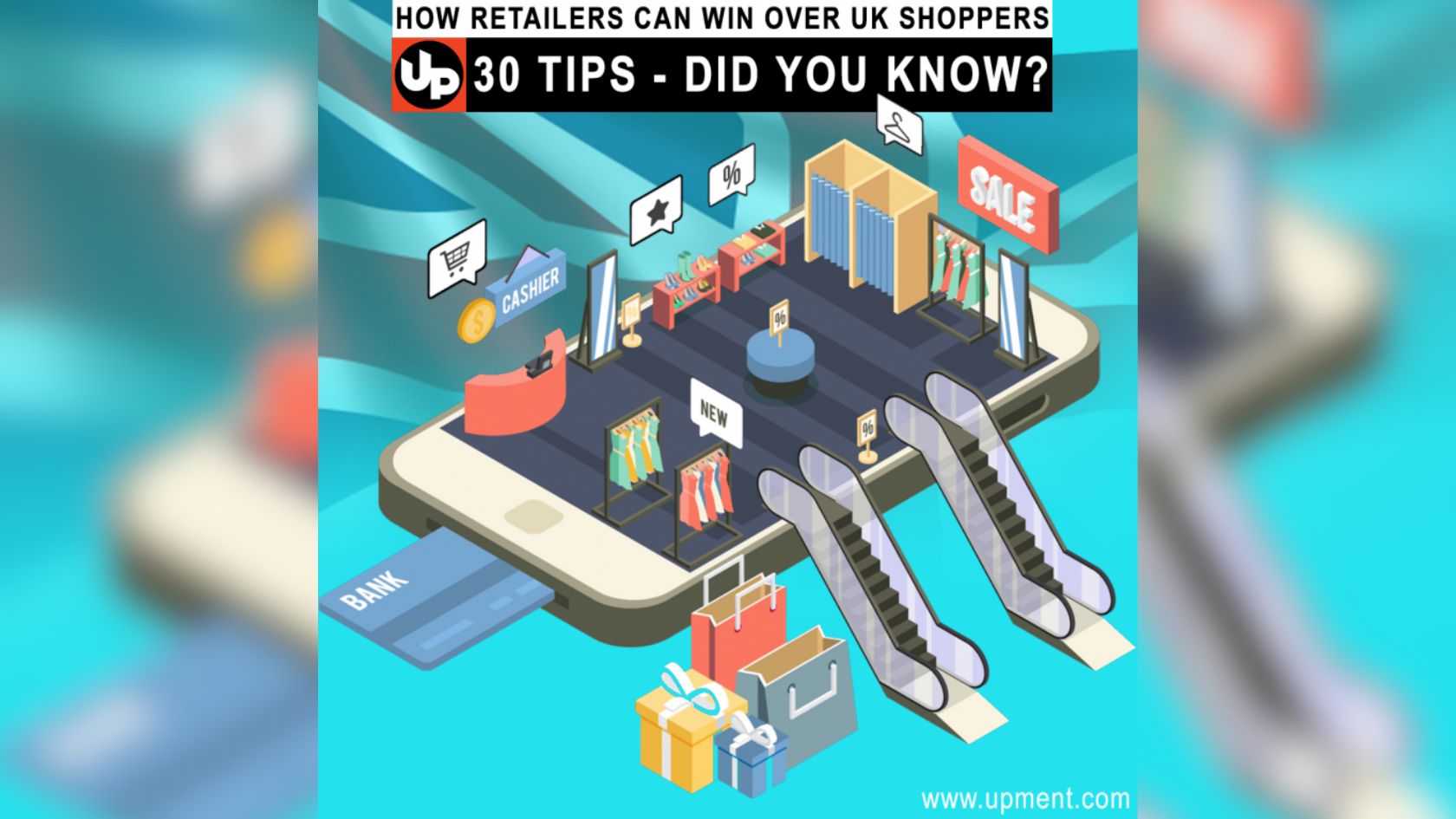We have created 30 top tips for your eCommerce business, even though the figures are UK centric, the tips are equally important to any business wanting to improve or open an eCommerce store.
eCommerce is booming in the UK, and is set to near the £175 billion barrier this year. Due to increasingly busy lifestyles, coupled with longer working, commuting hours and working from home, it’s perhaps no wonder that UK consumers are swapping walks on the high street with browsing online.
Tip 1
Brits make fewer unplanned purchases (8% vs 15% internationally), spend less time searching for the best price (22% vs 32% internationally) and just 11% feel overwhelmed with choice. 29% will return to a retailer after the first transaction if the retailer offers a wider range of products than similar brands.
Tip 2
24% of UK consumers have completed a transaction in less than two minutes, implying they know what they want and buy it.
Just 2% of UK consumers we researched have used Instagram shopping, and just 3% would be likely to buy from an influencer.
Tip 3
An easy to use website, quick load time, and product availability/accurate stock levels are crucial in not deterring potential customers.
Tip 4
Debit and credit cards must be available payment options in the UK – ahead of newer technologies such as cryptocurrency or e-wallet payment methods.
Tip 5
Free delivery remains the highest decider of whether a UK customer shops with a brand again, with nearly 2 in 3 (61%) saying this would influence them. Price and free returns were the other issues which made the top three, demonstrating the desire for a frictionless experience.
Tip 6
Research shows the UK to be an enigma at times in what consumers really want. Data protection and no irrelevant emails are vital in keeping consumers happy, yet personalisation is not ranked as highly important – a contradiction.
Tip 7
The UK cares about the environment, and shoppers are more likely to favour retailers that don’t use single use plastics (32%), limit their supply chain emissions (29%) and minimise packaging (47%).
Tip 8
When selling to UK customers, research overwhelmingly showed that consumers want traditional payment methods, and care less about emerging payment technologies like mobile wallets and cryptocurrencies.
Tip 9
Tried and trusted payment methods were the winners amongst UK shoppers. Surprisingly, Brits were more attached to debit cards than credit cards. Over half (51%) of consumers would avoid an online retailer if they did not accept debit cards – significantly higher than the 33% international average. This went down to just over a third (35%) when asked about credit cards.
Tip 10
The UK was far less concerned about digital payments – specifically cryptocurrencies (just 2% of UK shoppers would be deterred compared with 6% internationally) and e-wallet payments. Just 13% of UK respondents said they would avoid shopping with a retailer online if they didn’t accept the payment method, compared with nearly a third internationally (29%).
Tip 11
When consumers were asked what key factors influenced them to become a repeat customer, the biggest driver for UK consumers was free delivery, with 61% saying this would be a deciding factor.
Tip 12
Frictionless experiences keep customers coming back
Price (compared to other competitors) was another important issue, as was a free returns policy (42%) – demonstrating the importance of a frictionless experience both pre and post sales. Surprisingly, 18-24 year olds were the least concerned about free returns (32%), with 45-54 year olds (44%) driving demand for this offering.
Tip 13
Frictionless experiences keep customers coming back
Other important features included loyalty schemes (33%) and the opportunity to buy online and pick up in store (24%).
Tip 14
Frictionless experiences keep customers coming back
Surprisingly research suggests that consumers are confused by industry terms. Just 5% of UK online shoppers valued personalisation. However when you consider that they do not want to be sent irrelevant information, then it implies they don’t fully understand the terms and benefits.
Tip 15
Localised sites are a must for retailers, catering to local payment preferences.
Tip 16
The buyer journey doesn’t end when a customer makes a purchase, the post conversion customer experience is equally important.
Tip 17
To bring down the cost of customer acquisition, consider what drivers are most likely to delight consumers and encourage repeat buying. This could include changing the delivery and returns offering, to cater to this growing demand.
Tip 18
Perception matters
Brand perception can be the difference between a consumer clicking on your website or that of a competitor. Research shows that 44% of consumers said a brand’s reputation would make them more likely to shop with that company again.
Tip 19
Being green helps enhance a reputation
However, it’s not just about a good looking website, social media following or how a brand is portrayed in the news – it goes deeper than that. For example, environmental impact is increasingly becoming a differentiator.
Just under a third of UK consumers (30%) said they would be more likely to choose a retailer which tried to minimise air miles. Retailers which do not use single use plastics were also a popular choice (32% vs 24% international average), along with those who try to eliminate supply chain emissions (29% vs 26% average). However, the biggest differentiator was retailers that minimise packaging, with almost one in two (47%) choosing this as important.
Tip 20
For those retailers looking to rise up the SEO rankings and set themselves apart from their peers – appealing to consumers’ green preferences could help deliver a new customer.
Tip 21
Ease of use trumps aesthetics
For UK consumers, the most important factor when shopping online was that a website is easy to use – exceeding the international average. Over half (56%) stated this was a deciding factor, and prioritised it over aesthetics (16% vs 25% internationally). Other necessities were quick load time (41%) and products/sizes being in stock (34%).
Additionally, one in four respondents (25%) wanted a website that loads well on a smartphone, with 18-45 year olds driving this demand.
Tip 22
Data matters to UK consumers
UK consumers wanted assurance that their data was protected, with 51% citing this was a key factor. The age demographic least concerned with their data being protected was 18-24 year olds, with only 40% choosing this as an important factor. The older the respondent was, the more concerned they were, with 55+ year olds the most concerned.
Tip 23
Biggest bugbears that lose loyal customers
When we asked what retailers should not do, we found that UK shoppers are least tolerant of being sent irrelevant information with 28% saying they would unsubscribe from a mailing list if the retailer sent wrong or irrelevant communications.
18-24 year olds were the most likely to say this (37%), with 45-54 year olds the most tolerant at 24%. Additionally 10% would stop shopping with a retailer that suggests the wrong items to them when browsing online. Without careful targeting there is a strong potential to lose customers, retailers need to take heed and ensure they are only sending relevant, useful information to their shoppers.
Other bugbears of UK shoppers included needing to pay for returns. 19% said they would abandon their cart if free returns were not an option. Although there was slight regional variation. Those in Wales were more likely to abandon their cart if free returns were not offered – 23% compared to just 15% of Londoners.
Tip 24
UK shoppers less impulsive than their international peers
Compared to international respondents, UK shoppers were more circumspect. For example, they make fewer unplanned purchases (8% vs 15% internationally), spend less time searching for the best price (22% vs 32% internationally) and just 11% feel overwhelmed with choice.
All this implies that UK shoppers know what they want and buy it when they want – perhaps why 24% of consumers have completed a transaction in less than two minutes.
UK shoppers also seem to have minds of their own. Just 3% said they would buy a product if it were endorsed by an influencer, with 18-24 year olds most likely to be persuaded. Internationally, this was higher at 11%. Additionally, just 2% would or have made a purchase through Instagram shopping, with 25-34 year olds most likely to do so. This was against 7% internationally.
Tip 25
What matters for the UK shoppers
Easy navigation, combined with quick load times and accurate stock levels is key to pleasing the customer, alongside offering free delivery and returns, thereby giving them every reason to click “Buy”
Tip 26
What matters for the UK shoppers
Brand reputation is important. Retailers should publicise their environmental credentials, as this could help consumers choose their brand over another to shop with.
Tip 27
What does matter to UK shoppers
Send pertinent offers but generally when UK shoppers go online they know what they want, so cater to this and don’t bombard them with irrelevant offers.
Tip 28
Is service more valuable than the human touch?
With the advent of AI and customer-relations technology, we wanted to understand from consumers views on automation and artificial intelligence.
UK shoppers ranked the lowest in likelihood of purchasing from a fully automated company – that didn’t have any human employees, only robots and AI. Just 9% said they were likely to purchase – compared with 33% internationally, which were all far more willing to embrace automated companies.
In fact, one in three (32%) said full automation would make them less likely to purchase – demonstrating that UK shoppers still value a human touch. Whilst 18-24 year olds were the most open to automation, the preference was still low. Future thinking retailers should implement AI and automation technology that enhances — rather than replaces — traditional employee customer service. For instance, automating elements of the checkout process to reduce time at the till, or arming employees with smartphones that can access information on stock availability in real-time will help drive value whilst retaining human interaction.
Tip 29
What does the future hold for online shopping?
UK shoppers are skeptical about automation and AI – and will perhaps not shop with a retailer if they think service delivery is at the expense of the human touch.
Younger shoppers feel more comfortable with an automated approach – showing how digital natives will influence future customer service delivery.
Automated elements of the shopping experience should balance the need for efficiency, while proving to consumers how technology can improve their in-store experience.
Tip 30
What does the future hold for online shopping?
- Over half of UK consumers will avoid shopping online with a retailer if they don’t accept debit cards.
- 28% will unsubscribe from a mailing list if a retailer sends wrong or irrelevant communications.
- 24% of UK shoppers have completed a transaction in 2 minutes or less.
- UK shoppers still value traditional customer service. 32% of UK shoppers would avoid a fully automated retail experience.
- If free returns are not offered, 19% of UK shoppers say they will abandon their online shopping cart.
This is the last tip in the series. I hope you have enjoyed them and found them useful?
Remember everyone here is here to support your business growth
Where did this information come from?
YouGov interviewed 18,037 respondents online, from 15 countries. The daily tips I will be posting are specifically based on the 2,119 UK respondents. The interviews were taken between 14th June to 3rd July 2019.









